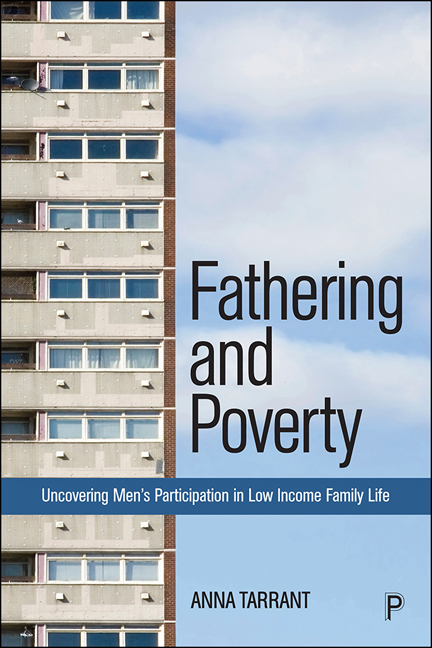Book contents
- Frontmatter
- Dedication
- Contents
- List of figures and tables
- List of abbreviations
- About the author
- Acknowledgements
- 1 Introduction: Fathering, poverty, families and policy
- 2 Low-income fatherhoods in historical and political context
- 3 Theorising men’s participation in low-income families
- 4 Supporting men in low-income contexts: practitioner observations
- 5 Men’s caring arrangements and family trajectories
- 6 Familial economic circumstances and provisioning practices
- 7 Men’s family participation in low-income urban neighbourhoods
- 8 Conclusion: Men’s family participation in low-income contexts
- Appendix A Participant information
- Appendix B ‘Existing evidence’ document shared at the knowledgeexchange workshop
- Notes
- References
- Index
6 - Familial economic circumstances and provisioning practices
Published online by Cambridge University Press: 30 April 2022
- Frontmatter
- Dedication
- Contents
- List of figures and tables
- List of abbreviations
- About the author
- Acknowledgements
- 1 Introduction: Fathering, poverty, families and policy
- 2 Low-income fatherhoods in historical and political context
- 3 Theorising men’s participation in low-income families
- 4 Supporting men in low-income contexts: practitioner observations
- 5 Men’s caring arrangements and family trajectories
- 6 Familial economic circumstances and provisioning practices
- 7 Men’s family participation in low-income urban neighbourhoods
- 8 Conclusion: Men’s family participation in low-income contexts
- Appendix A Participant information
- Appendix B ‘Existing evidence’ document shared at the knowledgeexchange workshop
- Notes
- References
- Index
Summary
‘£3.26 to clothe five kids.’
When Theo, age 39, made this point in his interview for the MLPC study, he was providing informal kinship care to his niece, great-niece (aged 16 and 1) and nephews (aged 19, 8 and 5) following the death of his sister at the age of 32, and of his father 16 months prior to that. He had left employment to provide care for his two youngest nephews, one of whom has suspected learning difficulties, and was living for five days a week in his sister's rented accommodation. The five children mentioned here did not include his son, aged 12, and stepson, aged 2, whom he saw only at irregular weekends when he was able. While a decision was being determined by social services about whether he would obtain a care order for his two youngest nephews, he was paying for this house out of his now depleted life savings and with some money borrowed from his mother. His mother, aged 61, has Crohn's disease and was incapable of providing care for the children. When he did spend weekends with his partner, son and stepson he had to rely on his eldest nephew and niece to look after the two youngest children. He explained that he felt like he was being forced by social services into securing a Special Guardianship Order because, in his view and in the longer term, this was cheaper for the local authority. While all this was happening (over the school summer holidays) he had just £3.26 a day to support all five children, not including his own.
Theo's quote has been used to open this chapter because it so effectively illustrates the key themes explored both in the research and this book. It demonstrates, albeit in one of the more extreme of situations, how both financial and emotional pressures infuse the process of decision making around appropriate and necessary caring arrangements to keep children in families. Theo's family participation was contingent on his being the most resourced and capable person in his family to support these children and because he was regarded as the best-placed family member to ensure that the two younger children remained in the family.
- Type
- Chapter
- Information
- Fathering and PovertyUncovering Men's Participation in Low-Income Family Life, pp. 127 - 152Publisher: Bristol University PressPrint publication year: 2021

